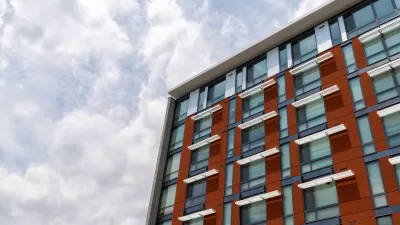A relative lack of conversions from office to residential—the adaptive reuse model driving the housing market in many urban areas—makes the Washington, D.C. region a perfect place to study the factors that make or break an adaptive reuse proposal.

Cities around the country have spent recent years converting old office buildings into residential uses. The wave of adaptive reuse projects in some local cases could be credited with creating entirely new residential neighborhoods.
"Yet despite considerable media coverage, office conversion has been comparatively limited in greater Washington," according to Payton Chung.
Chung cites research from a 2016 report by Jones Lang LaSalle that counted only 26 conversion projects in Washington, D.C.; Montgomery County, Fairfax County, and Arlington County combined. The whole D.C. region has completed "scarcely more" office conversions than the city of Baltimore alone.
According to Chung, the reasons for D.C.'s resistance to office conversions fit into two broad categories: a relatively healthier office market and a lack of specific incentives adaptive reuse. That could be about to change, however, as "Fairfax County and Montgomery County have recently commissioned studies to investigate office building adaptive reuse." In studying the issue, a couple of useful themes have emerged that can help determine the feasibility of adaptive reuse in other contexts, namely, location, price, and layout.
Chung's article goes into a lot more detail on each of those three considerations.
FULL STORY: Not every obsolete office building is cut out to become apartments

Maui's Vacation Rental Debate Turns Ugly
Verbal attacks, misinformation campaigns and fistfights plague a high-stakes debate to convert thousands of vacation rentals into long-term housing.

Planetizen Federal Action Tracker
A weekly monitor of how Trump’s orders and actions are impacting planners and planning in America.

In Urban Planning, AI Prompting Could be the New Design Thinking
Creativity has long been key to great urban design. What if we see AI as our new creative partner?

Massachusetts Budget Helps Close MBTA Budget Gap
The budget signed by Gov. Maura Healey includes $470 million in MBTA funding for the next fiscal year.

Milwaukee Launches Vision Zero Plan
Seven years after the city signed its Complete Streets Policy, the city is doubling down on its efforts to eliminate traffic deaths.

Portland Raises Parking Fees to Pay for Street Maintenance
The city is struggling to bridge a massive budget gap at the Bureau of Transportation, which largely depleted its reserves during the Civd-19 pandemic.
Urban Design for Planners 1: Software Tools
This six-course series explores essential urban design concepts using open source software and equips planners with the tools they need to participate fully in the urban design process.
Planning for Universal Design
Learn the tools for implementing Universal Design in planning regulations.
Gallatin County Department of Planning & Community Development
Heyer Gruel & Associates PA
JM Goldson LLC
City of Camden Redevelopment Agency
City of Astoria
Transportation Research & Education Center (TREC) at Portland State University
Jefferson Parish Government
Camden Redevelopment Agency
City of Claremont





























